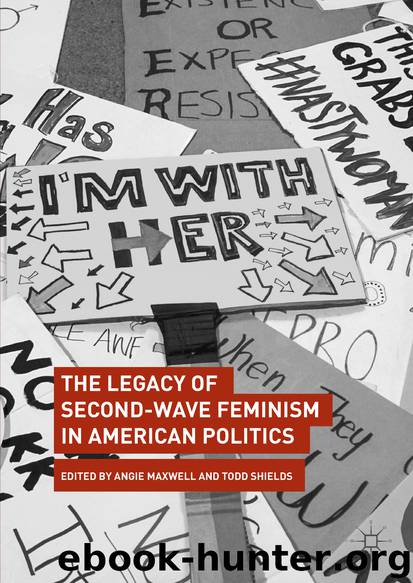The Legacy of Second-Wave Feminism in American Politics by Angie Maxwell & Todd Shields

Author:Angie Maxwell & Todd Shields
Language: eng
Format: epub
Publisher: Springer International Publishing, Cham
Other adherents to the discrimination narrative are more supportive of comparable worth. They argue that women are shunted into different jobs with similar work and skill requirements as those occupied by men, but are paid less because of crowding or because of social custom and discriminatory preferences. Comparable worth, by this line of reasoning, redresses this inequity. For example, Deb Figart and June Lapidus estimate that a comparable worth policy would reduce both gender and race inequality and alleviate poverty among women (Figart and Lapidus 1998).
Advocates of the “perfect market” narrative tend to share a common theoretical perspective on how labor markets work—the neoclassical model. Adherents to the discrimination narrative are not a monolithic group. For some adherents of the discrimination narrative, their disagreement with the perfect market narrative is primarily an empirical dispute—a difference in interpretation of the unexplained portion of the gender gap in the earnings, the gap that remains after adjustment for observable productivity-related attributes. In the face of empirical findings that are inconsistent with the predictions of the neoclassical model, 15 they propose alternative assumptions and derive a new set of predictions. For example, the neoclassical model assumes perfect competition. Economist Janice Madden at the University of Pennsylvania has offered a theory (Madden 1977) that assumes that women face imperfectly competitive labor markets. If markets are not perfectly competitive, then a wage gap due to discrimination does not erode over time. The neoclassical model assumes perfect information; if information is not perfect, then a different set of outcomes are predicted. Imperfect information can lead to statistical discrimination or stereotyping (Edmund Phelps 1972; Lundberg and Startz 1983). Because information is imperfect, employers may not know that two workers are equally productive and may make judgments based on historical precedents or stereotypes. For example, faced with two recent college graduates with identical resumes, an employer’s belief that a woman is more likely to shorten her tenure because of family responsibilities might reduce the attractiveness of the female candidate relative to the male candidate. Neither of these alternative models fundamentally challenge the central precepts of mainstream economic thinking, and they largely adhere to its methodological form and language. For example, a statistical discrimination model retains the core assumption of self-interested individual actors acting to maximize individual happiness in the face of institutional and resource constraints, and hence, are not radical departures from mainstream economics.
Download
This site does not store any files on its server. We only index and link to content provided by other sites. Please contact the content providers to delete copyright contents if any and email us, we'll remove relevant links or contents immediately.
The Rules Do Not Apply by Ariel Levy(4968)
On the Front Line with the Women Who Fight Back by Stacey Dooley(4872)
The Lonely City by Olivia Laing(4801)
Bluets by Maggie Nelson(4556)
The Confidence Code by Katty Kay(4260)
Three Women by Lisa Taddeo(3433)
Not a Diet Book by James Smith(3425)
Inferior by Angela Saini(3313)
Confessions of a Video Vixen by Karrine Steffans(3308)
A Woman Makes a Plan by Maye Musk(3254)
Pledged by Alexandra Robbins(3177)
Wild Words from Wild Women by Stephens Autumn(3153)
Nice Girls Don't Get the Corner Office by Lois P. Frankel(3044)
Brave by Rose McGowan(2823)
Women & Power by Mary Beard(2767)
Why I Am Not a Feminist by Jessa Crispin(2760)
The Girl in the Spider's Web: A Lisbeth Salander novel, continuing Stieg Larsson's Millennium Series by Lagercrantz David(2721)
The Clitoral Truth: The Secret World at Your Fingertips by Rebecca Chalker(2720)
I Who Have Never Known Men by Jacqueline Harpman(2669)
